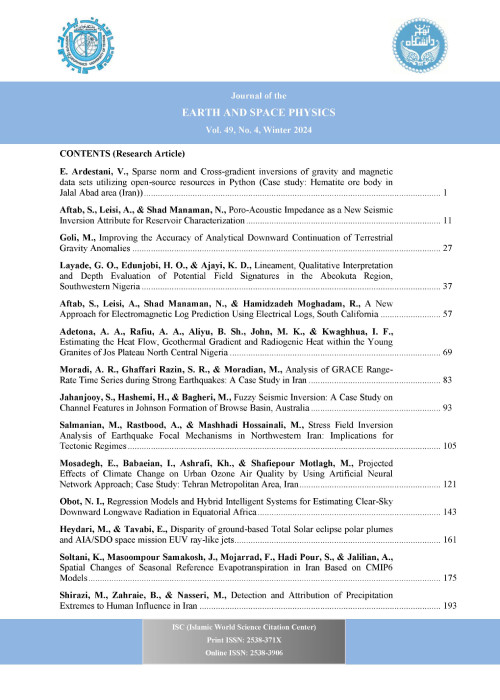Using the Multiplicative Schwarz Alternating Algorithm(MSAA) for Solving the Large Linear System of Equations Related to Global Gravity Field Recovery up to Degree and Order 120
Abstract:
The GRACE mission has substantiated the Low–Low Satellite-to-Satellite Tracking (LL-SST) concept. The LL-SST configuration can be combined with the previously realized high–low SST concept in the CHAMP mission to provide a much higher accuracy. The line of sight (LOS) acceleration difference between the GRACE satellite pair is the most frequently used observable for mapping the global gravity field of the Earth in terms of spherical harmonic coefficients. The following relationship is valid for each evaluation point: (1) The GRACE ranging system provides inter-satellite range and its first time derivative,, as the LL-SST observations and the GPS receivers mounted on the GRACE satellites provide the position vectors as the HL-SST mode observations. The inter-satellite range acceleration,, and are obtained by numerical differentiation of and, respectively. In the absence of non-gravitational forces, the left-hand side of Eq. (1) can be considered as the LOS gravitational acceleration differences, (2) A sequence of observations with evaluation points sets up a system with linear equations. In this paper, the corresponding linear system of equations has been set up for spherical harmonic up to degree and order 120. The total number of unknowns,, is (3) Such a linear equation system can be solved with iterative solvers or direct solvers. However, the runtime of direct methods or that of iterative solvers without a suitable preconditioner increases tremendously. This is the reason why we need a more sophisticated method to solve the linear system of problems with a large number of unknowns. Multiplicative variant of the Schwarsz alternating algorithm is a domain decomposition method, which allows it to split the normal matrix of the system into several smaller overlaped submatrices. In each iteration step the multiplicative variant of the Schwarz alternating algorithm solves linear systems with the matrices obtained from the splitting successively. It reduces both runtime and memory requirements drastically. An MSAA example with two submatrices is shown in Fig. 1 Figure 1. MSAA example with two submatrices. This method dates back to H. A. Achwarsz’ work, published in 1980, and has been investigated by many authors since then. In this paper we propose the Multiplicative Schwarz Alternating Algorithm (MSAA) for solving the large linear system of gravity field recovery. The proposed algorithm has been applied in a close-loop simulation to the International Association of Geodesy (IAG)-simulated data of the GRACE mission. The achieved results indicate the validity and efficiency of the proposed algorithm in solving the linear system of equations from accuracy and runtime points of view.
Language:
Persian
Published:
Journal of the Earth and Space Physics, Volume:37 Issue: 1, 2011
Page:
33
magiran.com/p877990
دانلود و مطالعه متن این مقاله با یکی از روشهای زیر امکان پذیر است:
اشتراک شخصی
با عضویت و پرداخت آنلاین حق اشتراک یکساله به مبلغ 1,390,000ريال میتوانید 70 عنوان مطلب دانلود کنید!
اشتراک سازمانی
به کتابخانه دانشگاه یا محل کار خود پیشنهاد کنید تا اشتراک سازمانی این پایگاه را برای دسترسی نامحدود همه کاربران به متن مطالب تهیه نمایند!
توجه!
- حق عضویت دریافتی صرف حمایت از نشریات عضو و نگهداری، تکمیل و توسعه مگیران میشود.
- پرداخت حق اشتراک و دانلود مقالات اجازه بازنشر آن در سایر رسانههای چاپی و دیجیتال را به کاربر نمیدهد.
In order to view content subscription is required
Personal subscription
Subscribe magiran.com for 70 € euros via PayPal and download 70 articles during a year.
Organization subscription
Please contact us to subscribe your university or library for unlimited access!


